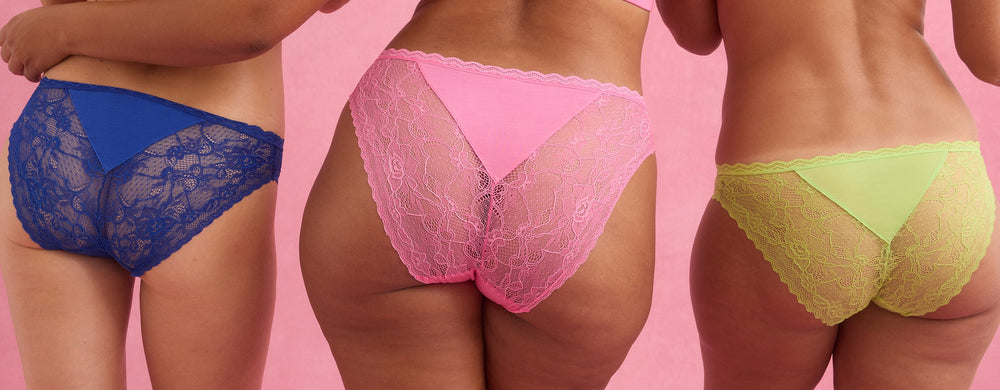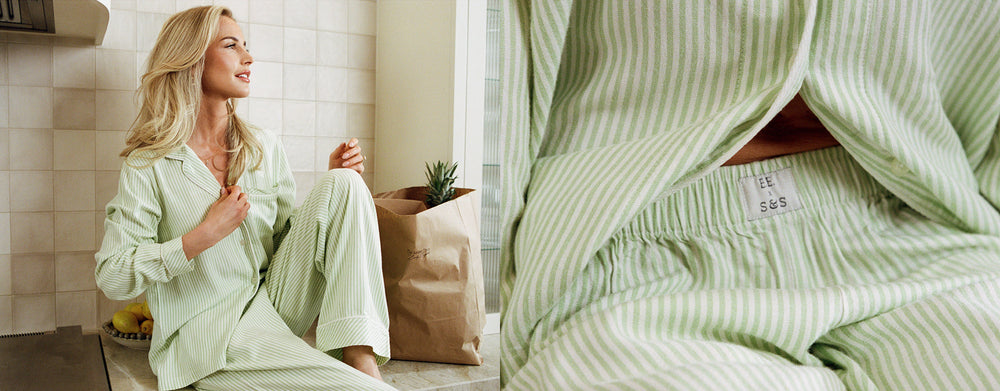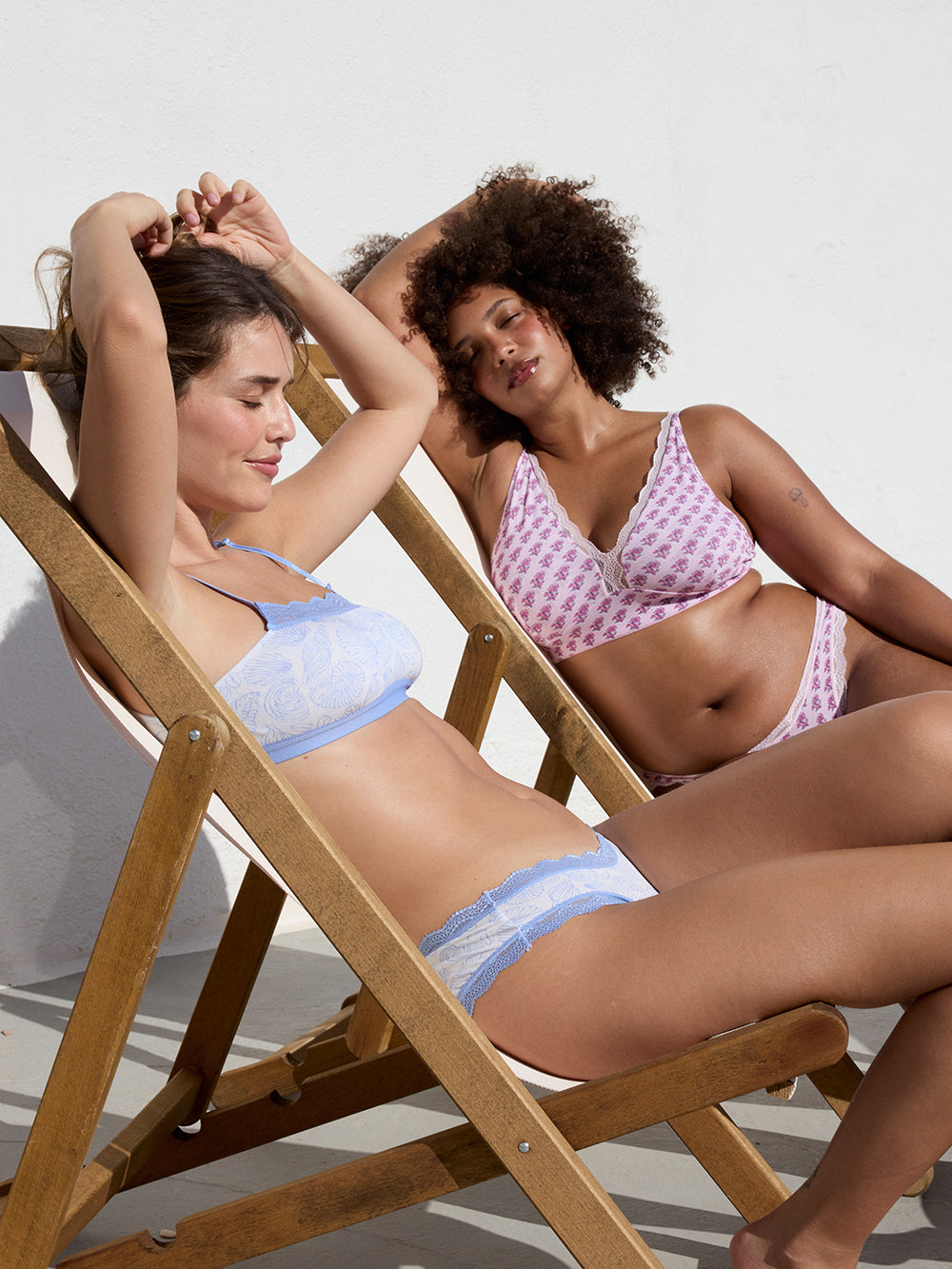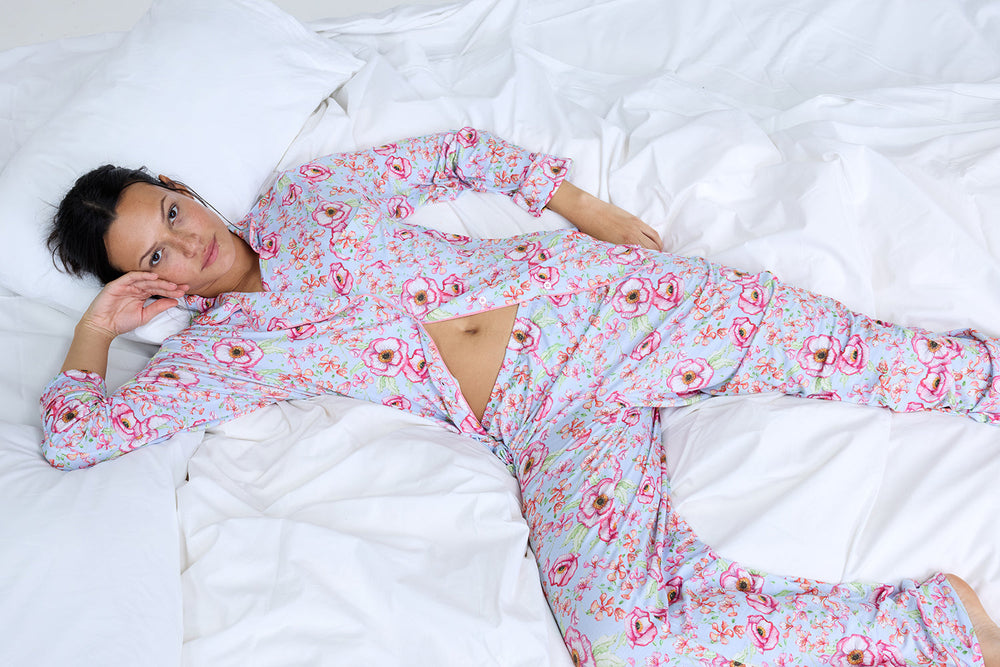You might recognise Rosie from our Kerri Rosenthal campaign shoot, dancing around in neon knickers and laughing away to the camera. But Rosie reveals that her perfect-looking life is not all that it seems. We chat with Rosie on all things Stripe & Stare, her go-to beauty hacks and her struggles with bipolar.

Q: What made you decide to model?
A: Getting into modelling was a weird one for me. When I was 15 years old my boyfriend at the time lost interest in our relationship and started dating another girl from Cheltenham who was signed to models 1 at the time - commuting up to London to start work. I was incredibly jealous and made it a mission of mine to win him back by getting into her industry too. I had a lot of rejections from agencies due to my height (5”6 at the time). I got very fed up with this. So meeting Select, the agency I am still signed too now, I put wooden blocks in my socks in 2015. I had modelled with smaller agencies in the two years before this but my career really started when I had their support behind me.
Q: What’s your favourite piece from Stripe & Stare?
A: My favourite pieces to wear have been the matching neon sets. I can’t believe how comfortable they are and I love that the pants become interchangeable yet still match the tops!
Q: Favourite music, holiday and/or film?
A: My music taste is honestly so random. I’ll be listening to a relaxing playlist with artists like James Blake/ The Beatles or Rhye - and then have an urge to listen to Nelly Furtardo and so add it into the mix. I’m also really keen to listen to new genres, as classical music was something I only got really into listening to a few years ago. I know nothing about Jazz yet and I’d love to see why it’s following is so passionate about it.
Q: Top beauty hack?
A: Hot flannel! I have had waves of bad skin - which have always come for me when work is busier and there’s heavy foundation around. Recently I’ve been lucky to work for brands who don’t go for this look - but I still find washing my face properly twice a day keeps it feeling really clean and fresh. Sometimes I’ll use ‘Ultrabland’ - from LUSH, a cleanser my friend Maddie introduced me too.
Q: Apart from modelling what do you love to do in your spare time?
A: It’s really mad to write this but I am currently getting the most enjoyment out of the work I am doing on the side of my job. Following my diagnosis of bipolar 1 in 2018 I found it really difficult to get back into a headspace of modelling. I had a really rough time and coming out the other side of a bad episode felt a responsibility to share my recovery and speak out using my platform about mental illness instead of mental wellness. I own a jewellery brand, organise themed events and do presenting work. To wind down I love all things music related, reading, exercising, and spending time with close friends.

Q: Your life looks perfect from the outside - would you tell us what it is like living with bipolar?
A: Everyone with a bipolar diagnosis has such a different experience so I’ll be honest that it is a hard one to describe in a general sense, or even to articulate how it feels. However, the best way I find to help people understand it is on a mood scale - the average person will go between a 4 and a 6. On a bad day they’ll dip down slightly - while good news can send them into a 6. Somebody with bipolar 1 goes between 1 and 10 - meaning the variations we feel in mood are much wider. The diagnosis also means you are able to switch quickly between feeling low or high, known as a mood swing.
In my case I am someone who has rapid cycling. This means that if something triggers me to feel low I will have a mood swing and go delusional in my thoughts extremely quickly/feel suicidal straight away. The pace at which this happens still shocks me four years on from my diagnosis: and can leave me feeling really scared and panicked. When this happens, I have to cancel meetings/social plans and get myself out of the state as soon as possible. Luckily, and the reason I speak openly about this now, is that I feel very good at managing it now. Whenever I hit this low I remind myself that I am equally able to ping up just as fast - and turn to my list of coping mechanisms, or text friends who have bipolar (I feel very lucky to be able to say this one). I also take an anti-psychotic medication called ‘Quetiapine’ every night - which can be increased in strength if I am still struggling to get out of a low a day later.
Equally, I am very sensitive to hyper mania at the moment. My average time feeling like this is probably between 1 and 3 hours. It is such an incredible natural high I feel lucky to experience, and difficult to put into words. I am getting better about being honest with friends when I feel like this, although I think they can tell haha. I manage this getting out of hand through exercise and sensible sleep hygiene. If I feel like this over a weekend I will dance it off or see friends and just make the most of the connection you feel with others. The diagnosis has helped me manage a state I previously had no label for. This is amazing in stopping me spending money/going out drinking - as I’m now aware that this could cause a low afterwards.
Q: We’re all about women supporting women. What advice would you give someone struggling with type 1 bipolar?
A: Detach as much as possible. Intrusive thoughts with bipolar are definitely the most intense aspect. When I am high my intrusive thoughts become very religious or very creatively intense/non-stop ideas etc. I use classical music to try and slow my mind: but any form of meditation or journaling has been shown to be some of the best ways to get through this. Equally, when I am low, I remind myself the negative thoughts are not my fault. It’s difficult to not have a break down when your brain suddenly tries to tell you you are worthless. For me - speaking to others with bipolar helps this more than anything as other friends just simply can’t relate to the extremity of our lows. I try to give myself the same level of comfort I would to my friends with Bipolar and that really helps.
Q: How could people better educate themselves about mental health disorders?
A: The MIND UK website is actually incredibly useful as a resource. Some of my closest friends turned to this around the time of my diagnosis and I really feel that it articulates and explains terms and treatments really well. Equally - if you’re a reader - I’d recommend ‘Manic’ by Terri Cheney, ‘Living At The Speed Of Light’ by Katie Conibear or ‘Winning The War Within’ by Samuel Swidzinski. Personal accounts will always win on authenticity around understanding!
Q: What do you wish you knew about bi-polar that you didn’t know before?
A: I wish I knew when I was diagnosed that it could be manageable when taken seriously/respected. My introduction to the term came at a time I was in Ealing Hospital for three months - which made me just so scared for my adult life. Having someone explain the difference between a hyper manic state and a full-blown manic episode would have really helped me get my head around what was going on at such an unstable time.
Q: What’s the common misconception you found with bipolar?
A: I find that the word ‘impulsive’ or ‘intense’ is often used around the understanding of bipolar - which has really upset me in the past. What I can’t stress enough is that when I am hyper manic my brain is moving about 3 X faster and so I am personally not finding the decisions I make any quicker than the ones I make out of hyper mania. These two words also imply everyone with bipolar has a similar temperament - which simply isn’t true. My favourite thing to do on a weekend I feel high is go walking or read/relax. If anything, it sometimes causes me to become very quiet and reserved while I shift my focus to my thoughts over the activity, I may be present in.

We love Rosie's authenticity and openness to spread the word about Bipolar but not only that, her passion for her new endeavours. Read her full interview on our blog here where she touches on more detail about her Mental Health disorder and the misconceptions of it. For any further information and support on Mental Health, like Rosie says please visit Mind.















